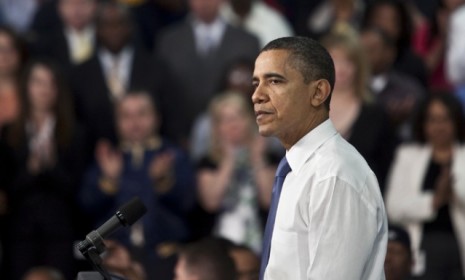3 ways the job market is still in trouble
The latest unemployment report was hailed as evidence that the economy had finally turned the corner. But are the headlines masking the true picture?

"America is coming back," President Obama declared on Friday, hours after the government reported that the economy added more than 200,000 jobs in February. You can hardly blame the president for tooting the economy's horn — his re-election in November largely hinges on rising job numbers. But is the labor market really healing? Some analysts say a closer look at the data reveals some worrisome trends. Here, three ways the job market recovery is not as healthy as it appears:
1. The economy is not adding the right jobs
Job numbers are rising because the economy is adding temporary workers, says Zachary Karabell at The Daily Beast, and creating jobs in the health-care and food-service industries. "An economic system whose primary growth comes from orderlies, bartenders, and temps is hardly the recipe for long-term affluence and global pre-eminence." These are "honorable professions," but when they're the only sectors expanding consistently "we should not be quick to tout a robust system on the mend."
The Week
Escape your echo chamber. Get the facts behind the news, plus analysis from multiple perspectives.

Sign up for The Week's Free Newsletters
From our morning news briefing to a weekly Good News Newsletter, get the best of The Week delivered directly to your inbox.
From our morning news briefing to a weekly Good News Newsletter, get the best of The Week delivered directly to your inbox.
2. The workforce is shrinking
The jobless rate isn't falling because the economy is growing, says Gavyn Davies at Financial Times. It's falling because the workforce has shrunk. Some workers have simply retired. But others have dropped out because the "exceptional depth" of the recession has convinced them "there is no point in actively seeking work." The downsizing of the labor pool "leaves the potential output of the economy lower than it was before and may explain why Americans" don't feel like a strong recovery is underway.
3. Workers aren't earning enough
Over the past year, average hourly wages rose 1.9 percent, says Anthony Mirhaydari at MSNMoney. Given that inflation "has averaged 3.1 percent over the past year, even people who can find jobs are simply falling behind the rising cost of living." This is why the boost in job numbers hasn't really lifted consumer spending — which is the main engine of the economy. It's not time to "unfurl the 'Mission Accomplished' banner" quite yet.
A free daily email with the biggest news stories of the day – and the best features from TheWeek.com
-
 World’s oldest rock art discovered in Indonesia
World’s oldest rock art discovered in IndonesiaUnder the Radar Ancient handprint on Sulawesi cave wall suggests complexity of thought, challenging long-held belief that human intelligence erupted in Europe
-
 Claude Code: the viral AI coding app making a splash in tech
Claude Code: the viral AI coding app making a splash in techThe Explainer Engineers and noncoders alike are helping the app go viral
-
 ‘Human trafficking isn’t something that happens “somewhere else”’
‘Human trafficking isn’t something that happens “somewhere else”’Instant Opinion Opinion, comment and editorials of the day